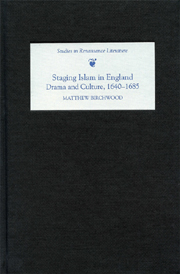Book contents
- Frontmatter
- Contents
- List of illustrations
- Acknowledgements
- Introduction
- 1 Cultural Encounters between England and Islam in the Seventeenth Century: A Topography
- 2 Framing ‘an English Alchoran’: The Famous Tragedie of Charles I and the first English translation of the Qur'an
- 3 Orienting the Monarch: Tyranny and Tragedy in Robert Baron's Mirza and John Denham's The Sophy
- 4 Turning to the Turk: Collaboration and Conversion in William Davenant's The Siege of Rhodes
- 5 Toleration, Trade and English Mahometanism in the Aftermath of Restoration
- 6 Plotting the Succession: Exclusion, Oates and the News from Vienna
- Conclusion: ‘If we our selves, would from our selves exam'ne us’
- Bibliography
- Index
- Studies in Renaissance Literature
4 - Turning to the Turk: Collaboration and Conversion in William Davenant's The Siege of Rhodes
Published online by Cambridge University Press: 12 September 2012
- Frontmatter
- Contents
- List of illustrations
- Acknowledgements
- Introduction
- 1 Cultural Encounters between England and Islam in the Seventeenth Century: A Topography
- 2 Framing ‘an English Alchoran’: The Famous Tragedie of Charles I and the first English translation of the Qur'an
- 3 Orienting the Monarch: Tyranny and Tragedy in Robert Baron's Mirza and John Denham's The Sophy
- 4 Turning to the Turk: Collaboration and Conversion in William Davenant's The Siege of Rhodes
- 5 Toleration, Trade and English Mahometanism in the Aftermath of Restoration
- 6 Plotting the Succession: Exclusion, Oates and the News from Vienna
- Conclusion: ‘If we our selves, would from our selves exam'ne us’
- Bibliography
- Index
- Studies in Renaissance Literature
Summary
WHETHER MEDIATED ON STAGE, from the pulpit or via the polemical press, one of the most abiding preoccupations of English treatments of Islam in the period was conversion. From the sixteenth century onwards, stories of Englishmen who had ‘turned Turk’ abounded, fuelled by the growing depredations of the Barbary corsairs in the Mediterranean where English shipping plied the routes of the burgeoning Levant trade. Long-held misgivings about the threat of further Ottoman encroachment in Europe were overlaid with what was, from an English point of view, the more immediate and tangible peril of piracy and potential captivity. Moreover, from the early part of the seventeenth century, Barbary ships had ventured as far as the Channel, and the coastal regions of England and Ireland were themselves subject to raids. More alarming to many commentators than the suffering of those captives sold or ransomed as booty was the possibility that Christians might succumb to the religion of their captors, seduced by the material or even spiritual allure of this rival doctrine; according to one prevalent reading of the geopolitical situation, Islam and Christianity were in direct competition for souls and, where the two collided, it seemed that the infidel was winning. As the work of Nabil Matar has shown, a spate of dramatic texts respond directly to the anxieties aroused by the figure of the renegade by constructing a fantasy of Christian vindication whereby the renegade repents his apostasy or else suffers divine retribution.
- Type
- Chapter
- Information
- Staging Islam in EnglandDrama and Culture, 1640–1685, pp. 96 - 128Publisher: Boydell & BrewerPrint publication year: 2007



